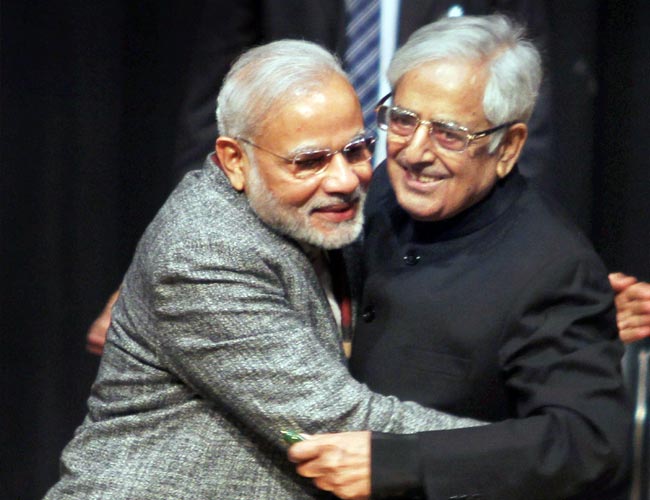MUFTI BRINGS KASHMIR TO A BOIL AGAIN, BACKS OFF BUT QUESTIONS REMAIN
Narendra Modi and Mufti Mohammad Sayeed

NEW DELHI: Jammu and Kashmir chief minister Mufti Mohammad Sayeed might have retracted from the deal he hatched with Prime Minister Narendra Modi and Union Home Minister Rajnath Singh to build separate townships for Kashmiri Pandits in the Valley but not without creating discord, anger and insecurity within the state. All communities are alienated, both regions Jammu and Kashmir are angry, with the state government being slammed by the opposition and the separatists together.
Mufti, faced with a hostile Assembly, did not wait to say that there was no question of these townships and that this was just a deliberate rumour being spread to vitiate the atmosphere. He did not explain on what basis a government spokesperson had made the announcement in categorical terms, after his meeting with PM Modi. It was clear from the nature of the announcement that the state Chief Minister had fully endorsed the proposal that has been placed on the anvil by the Bharatiya Janata Party long before coming to power in the state.
Again in this controversy, the BJP has gained and the Peoples Democratic Party has lost. The BJP has managed to convince its constituency in Jammu and other parts of India that it has not lost sight of its agenda in Jammu and Kashmir. And priority is being given to the resettlement of the Kashmiri Pandits in the Valley through extra measures such as the creation of segregated colonies for them with full security. Local Kashmiri pandits living in the Valley have opposed this along with all others pointing to the fact that this would create more rift and discord between the communities, but for the BJP and the organisations in Delhi this remains the ‘solution’ for this specific issue.
The PDP, however, has heavily dented the constituency it was catering to in the Valley during the elections with all sections in Kashmir now aware ---as a Valley scribe put it---that the Chief Minister “can sell the Valley for a song.” No one spoken to could justify Mufti’s endorsement of the proposal, expressing worry instead as to how he had gone along with the BJP on this very controversial matter. The opposition was clear in pointing out that this would create segregation, and go against the very grain of Kashmiriyat. “Mufti is supposed to know this, so he has to explain how he decided to shift the goalposts,” was the emerging consensus.
The CM has claimed that the decision was never reached. But given the evidence, it clearly was and hence clearly despite its election campaign the PDP is not particularly averse to accepting certain positions taken by its coalition partner the BJP. Just the separatists reaction might not have swayed the CM from his chosen path as this would have fed into the Kashmir versus Jammu face off, but the strong opposition from all other sections in the Valley left him with no choice but to back off.
The KPs ire is directed against Mufti for not living up to his assurance. THe BJP thus has got out of this controversy on the right foot as “wanting to but not being able to because of the PDP.”
But the real question that needs to be asked is what exactly is Mufti aiming at? What part of the PDP promises does he endorse? He has backed off on the withdrawal of the Armed Forces Special Powers Act that his party was very vocal about. Article 370 has not been abrogated as per the BJP charter, but it is in abeyance and both parties have decided to ignore it for the moment. The townships for KPs has been controversial, and hence the very fact that the Chief Minister endorsed it is not just surprising but significant as it suggests a closer degree of cooperation between the two parties that the PDP is willing to admit. The BJP, to give it its due, has no such hesitation and has made it apparent that it is prepared to work closely with Mufti on all issues.
Mufti’s passionate call for talks has not moved really so far. There is no indication that PM Modi is moving ahead with a dialogue with Pakistan, and while the hostile language has been replaced by more civilised language, there is no movement forward on the ground as yet suggesting an early resumption of talks. Also this is unlikely to be matched at this stage with the earlier working groups kind of dialogue between Srinagar and Delhi, as again the Prime Minister is not particularly interested in this activity at the moment.
After Masarat Alam, no political prisoner has been released. In fact given the opposition to Alam’s release from sections of the BJP the review of political prisoners per se seems to have come to a standstill.
Separatists have always maintained that the state government is there for “cleaning the streets, and ensuring levels of governance” and perhaps this is what the Chief Minister should focus on. Any move away, given the opposing agendas of the PDP and the BJP, will only lead to chaos and protests in one or the other part of the state, widening the chasm instead of bridging it. So far there is no visible agenda, or common points, that the two parties might have worked out post government for better coordination between the regions, and peace in the state.



